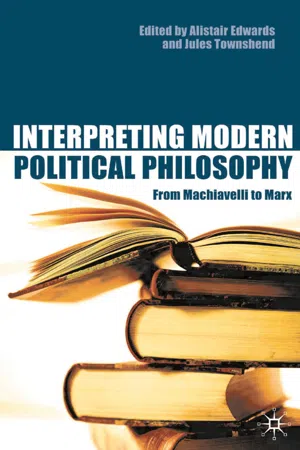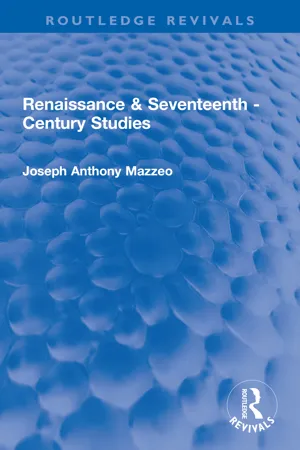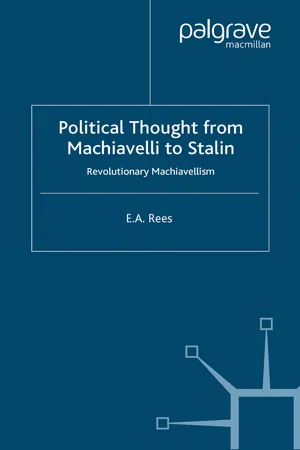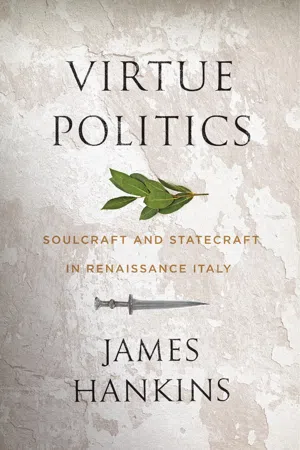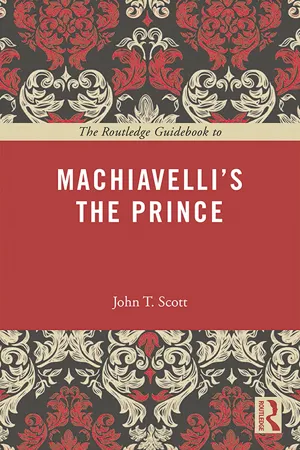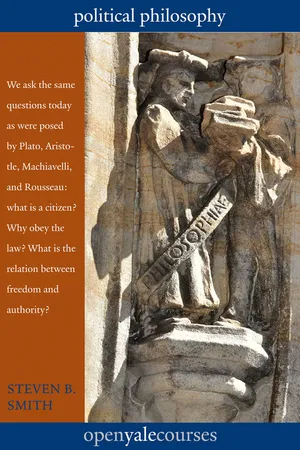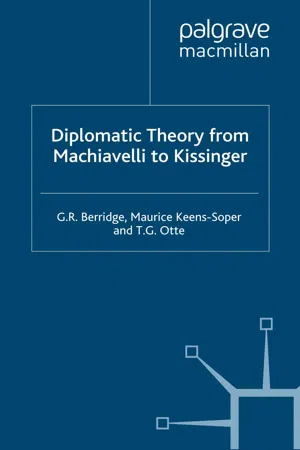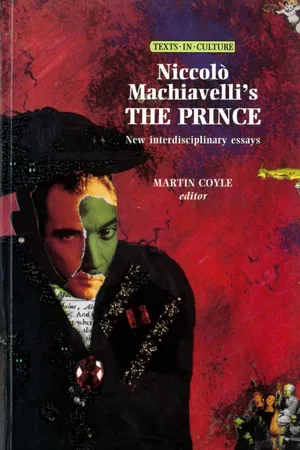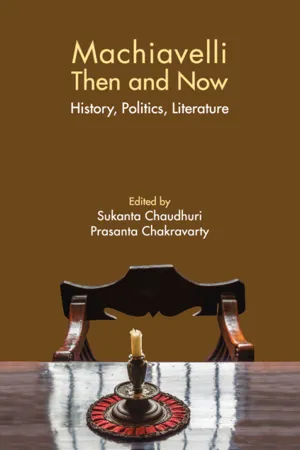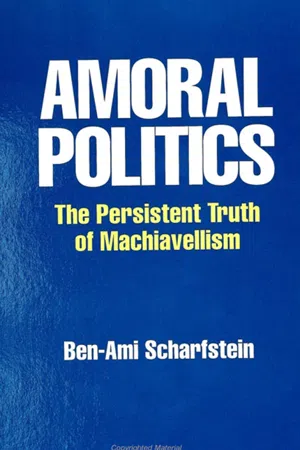Politics & International Relations
Niccolo Machiavelli
Niccolo Machiavelli was an Italian Renaissance political philosopher and diplomat. He is best known for his work "The Prince," in which he discussed the nature of power and the strategies rulers should employ to maintain control. Machiavelli's ideas, often associated with cunning and ruthlessness, have had a lasting impact on political thought and continue to be studied and debated.
Written by Perlego with AI-assistance
Related key terms
1 of 5
12 Key excerpts on "Niccolo Machiavelli"
- eBook - PDF
Interpreting Modern Political Philosophy
From Machiavelli to Marx
- Alistair Edwards, Jules Townshend, Alistair Edwards, Jules Townshend(Authors)
- 2017(Publication Date)
- Red Globe Press(Publisher)
1 Machiavelli (1469–1527) M AUREEN R AMSAY Introduction Machiavelli is a pivotal figure in the history of political thought. His views of human nature, society and government mark a break with medieval philosophy and sixteenth-century political theory based on teleological assumptions about God’s purposes for man. Machiavelli divorced politics from higher purposes, from Christian morality, from theology and from religion. He conceived the state as functioning solely for human purposes and constructed rules of conduct that were not moral rules, but which were informed by a realistic and practical view of the world gleaned from obser-vation of events and examples drawn from history. Machiavelli radically secularised political thought and initiated new ways of looking at man and society. It is with Machiavelli, that modern social and political theory begins. Machiavelli is best known for his two major political writings, The Prince , and The Discourses on The First Ten Books of Titus Livy . Although the Art of War , The Discourses and the Florentine Histories are relevant to his political thinking, it is the two former works and the relationship between them, which form the core of Machiavelli studies. Throughout all his political writings, Machiavelli claimed to have one fundamental purpose – to discover how to establish and maintain an independent state in corrupt Renaissance Italy. To do this, he intended to break with ancient and medieval thought with its theological and metaphysical underpinnings and to cam-paign against illusions about politics rooted in the Christian or the idealistic thought of his predecessors. He aimed to blaze a new trail of political analysis in order to reach the truth of practical politics. Machiavelli saw himself as an innovator. In The Prince (hereafter P ; see A. Gilbert, 1965), he announces that he is departing from ‘the methods of 21 22 Machiavelli (1469–1527) others’ in order to ‘write something useful for him who comprehends it’. - eBook - ePub
- Joseph Anthony Mazzeo(Author)
- 2021(Publication Date)
- Routledge(Publisher)
CHAPTER VIIMachiavelli: The Artist as Statesman
I T is as the author of The Prince that Machiavelli has received his greatest fame and, to some extent, this is unfortunate, for that brilliant and revolutionary book gives us too limited an impression of the variety of his thought. Nevertheless, any study of Machiavelli must certainly begin with this work and, I think, perhaps even end with it. For The Prince was a truly revolutionary book.It was the first and still is the most imaginative and compelling statement of what we have since come to call the dynamics of power politics, the first in a long line of speculative inquiries into the nature and uses of political power.1Classical and medieval political theory had been subordinated to traditional ethics, and I wish here to stress the word ‘theory,’ for power politics obviously existed before Machiavelli and continues after him. Although the amoral character of at least some necessary political action did not escape the attention of political theorists before him, they could not help analysing such behaviour and judging it from the traditional ethical point of view. This ambivalence was even stronger in men of affairs, who frequently offered and may even still offer dubious ethical generalizations for their own behaviour. While traditional legal theory before Machiavelli had recognized instances where the force of facts dictated courses of action not entirely justifiable from the ethical perspective, political theory continued to keep itself subordinated to ethics in the hierarchy of knowledge.This cultural situation changed with the writing of The Prince. In that book Machiavelli studied politics as an activity with an autonomous aspect and attempted to arrive at the principles of statecraft by inference from actual instances of political success drawn from contemporary and ancient history. Not that The Prince is entirely a technical and descriptive work. It is certainly true that Machiavelli sometimes could not help making covert ethical judgments and that he had ideals and goals which he wished realized. Nevertheless, it is certainly the first great work in which divine moral injunctions and traditional ethical authority are in irreconcilable collision with secular human concerns, and this is true precisely to the extent that The Prince is in great part a technical treatise. In it the state appears in its simplest and most basic form, essentially although not entirely isolated from all the conditions which Machiavelli considered extraneous, including religious, social, and cultural ones.1 - eBook - PDF
Political Thought From Machiavelli to Stalin
Revolutionary Machiavellism
- E. A. Rees(Author)
- 2004(Publication Date)
- Palgrave Macmillan(Publisher)
They were to be accorded supreme military and civil powers, adding ‘they shall be subject to no 16 Political Thought from Machiavelli to Stalin one: the safety of the people shall be their highest law’ (olis salus populi suprema lex esto). 93 From the outset, Machiavelli’s works attracted very strong reactions. In England, Cardinal Pole, in his work The Defence of the Unity of the Church, expressed three views of Machiavelli which flourished in the sixteenth century: i) that The Prince was a useful handbook of political science, that described the reality of how political power is wielded; ii) that it was an immoral or amoral work, which deserved strong moral censure; and iii) that it was a political satire written in a spirit of bitter irony. 94 This was a perceptive appreciation of the different standpoints from which Machiavelli can be read. In succeeding centuries, the same approaches recur time and time again. The Machiavellian problematic relates to the politics of crisis, the politics of state formation or of the fundamental reform of the state. Machiavelli’s conception of politics can be reduced to a number of basic propositions that are all closely interconnected with one another: 1. His view of politics is elitist, but it is a qualified elitism. Those who wield power suffer from the same human foibles as the rest. Machiavelli emphasizes an activist view of politics, where courage, audacity and will power are of central importance. 2. It is based on a pessimistic view of human nature, and of the incom- petence of the masses. The masses constitute a major political force; they cannot be ignored, and they have a capacity to organize in pursuit of their own interests. 3. It recognizes the necessity of dictatorship for the construction or for the radical reform of states. It highlights the central role of violence and force in politics; force is the basis of all states and all law. - eBook - ePub
Performing Political Theory
Pedagogy in Modern Political Theory
- John Uhr(Author)
- 2018(Publication Date)
- Palgrave Pivot(Publisher)
1988 , xxiv). This grim doctrine of cynical politics comes in many forms: minimally, it can refer to wily deception to hide individual self-interest; more comprehensively, it can refer to the deceptive use of force and fraud in the hard grind of politics, even as practised by those promoting broadly public rather than narrowly personal interests.Machiavelli’s experience of politics drew on both of these forms of individual and collective interest. Machiavelli exercised considerable public power as a leading city official, a diplomat and as an adviser to the government (Skinner 1981 , 3–47). It therefore helps if students are interested in knowing something about the personal political activities of Machiavelli, especially if this relates to his decision to write The Prince as an exercise in rehabilitation: winning new favours from former enemies who, to protect the new Medici administration, had forced him out of public office as a prominent city official in Florence (Skinner 1988 , ix–x; Viroli 2000 , 119–140).Why Start with Machiavelli?
Sources like De Grazia’s Machiavelli in Hell provide lecturers with more than enough historical information to guide students to see Machiavelli as a seasoned practitioner as well as a grand theorist of politics. It helps to know what Machiavelli’s professional life as a significant public official was like when he was ‘on the job’ (De Grazia 1996 , 16–28). But the most important hint lecturers can give about the strange nature of Machiavelli’s ‘rehabilitation’ with those who forced him out of office is that The Prince is much more than a clever job application and much more than a stylish ‘mirror of princes’ flattering the new regime which ousted the writer Niccolo. The Prince is much more about theories and practices of ‘the new prince’ than the conventional rule of old or even existing princes (Skinner 1988 ; de Grazia 1996 , 232–240). Lecturers can do something important to prepare students in readiness for Machiavelli’s extraordinary innovation by alerting them to this theme of ‘the new prince’ about to be described in what might appear to be a work summarising the conventional wisdom of ruling and being ruled. The formal Latin title of the work reads in English as ‘On Principalities’—and not ‘On Princes’. Understandably we give the work the title of ‘The Prince’ because the core theme addressed by Machiavelli is that, wherever possible, the prince should define the nature of the principality: the principality is the medium but the message comes from the prince, especially ‘the new prince’ who is the subject of Machiavelli’s real message in this influential text (Lefort 2000 - eBook - PDF
Virtue Politics
Soulcraft and Statecraft in Renaissance Italy
- James Hankins(Author)
- 2019(Publication Date)
- Belknap Press(Publisher)
32 Machiavelli’s key argument, that one cannot adopt a consistent policy of goodness among so many who are not good, is taken Machiavelli: From Virtue to Virtù . 457 458 . virtue politics as unanswerable. Modern academics are hardly aware that older moral traditions exist which hold states to the same moral standards as individuals. 33 Typically, po-litical realism in international relations theory is contrasted with liberalism, which emphasizes cooperation among nations based on mutual interest, or uto-pian idealism, which holds that human nature can be made morally perfect only in a perfect world state, to be achieved on the Greek Kalends. 34 Many such “ideal-ists” do not regard it as a contradiction to work toward the perfect state through violent revolution, the planned murder of millions, and forms of oppression far beyond the imagination of any ancient tyrant. It is no accident that Machiavelli himself has become a much-admired figure in our time and that his Prince has been frequently adapted as a self-help book for ambitious politicians, businessmen, and bureaucrats. His worship of power appeals to many academics too, already drawn to the cult of Nietzsche and Foucault. Ma-chiavelli’s tendency to pontificate has been matched by the tendency of all too many of his readers to treat him as infallible. He was in fact a rather poor prophet and on salient issues predicted the exact opposite of what turned out to be the case. For example, he prophesied the inevitable reversion of Florence to repub-lican government, the imminent liberation of Italy from foreign invaders, and the inability of Christians to shake of the corruptions of church government. For a man believed to have extraordinary powers of observation and analysis, it remains astonishing that he seems to have lived through the Reformation without noticing it. - John T. Scott(Author)
- 2016(Publication Date)
- Routledge(Publisher)
11 Machiavelli’s Political Thought and His LegacyMachiavelli is most widely known as the author of The Prince, but he wrote a number of other works, including works of political theory. This chapter has two purposes. First, I will examine the relationship between The Prince and Machiavelli’s other writings, especially the Discourses on Livy, in order to contextualize his concerns in his short treatise within his thought as a whole. Without claiming to offer a comprehensive account of all the interpretations of The Prince and Machiavelli’s political thought, I will sketch some of the more important interpretative approaches that have been and continue to be influential. Second, since Machiavelli’s influence is inextricably bound up with the question of how his advice to princes in his short treatise is related to his other, seemingly more republican, works, I will discuss how various interpretations of his political thought have influenced later political thinkers and other writers, not to mention political actors. Finally, I will offer a few brief remarks at the end of the chapter on the legacy of The Prince more generally.The Prince and Machiavelli’s Other Political WritingsPutting aside the large body of diplomatic and other correspondence, memoranda, and other writings we have from the time when he was in active government service from 1498 to 1512, much of which exhibits some of the sane concerns and contains some of the kernels evident in his later political writings, including The Prince, Machiavelli’s political works were written after his fall from government service in 1512. As noted in Chapter 2 when discussing the composition of The Prince, Machiavelli began the work sometime in 1513 and seems to have completed it by the middle of 1515. He appears to have begun the other major political writing for which we now best know him, the Discourses on Livy, in 1515 and completed it by 1518 or 1519. At that point he took up his Art of War, which was published in 1521. In 1520 he was commissioned to write yet another major work, the Florentine Histories, which he finished in 1525. Finally, in addition to these major works on politics and related subjects, he composed his best-known comedy, Mandragola, around 1518. A full interpretation of Machiavelli’s thought would require an extended engagement with at least The Prince, the Discourses on Livy, and the Florentine Histories, along with some attention to the Art of War, Mandragola, and other writings, as well as to his personal and diplomatic correspondence. Such an interpretation is beyond the scope of this guide, and I will confine myself to a brief sketch of various possibilities of how we might understand the relationship of The Prince to Machiavelli’s other writings, and especially the Discourses on Livy- eBook - PDF
- Steven B. Smith(Author)
- 2012(Publication Date)
- Yale University Press(Publisher)
109 chapter 7 Machiavelli and the Art of Political Founding Portrait of Niccolò Machiavelli, 1469–1527. Palazzo Vecchio, Florence. Photo credit: Erich Lessing / Art Resource, NY 110 Machiavelli and the Art of Political Founding Machiavelli was a Florentine. To know that is to know virtually everything you need to know about him. I exaggerate, of course, but the point is that Florence was a city-state—a republic—and Machiavelli spent his life in the service of the republic. Living in Florence, the center of the Renaissance at the height of the Renaissance, he hoped to do for politics what his contem-poraries Leonardo da Vinci and Michelangelo had done for art and sculp-ture. He hoped to revive the spirit of the ancients, of antiquity, but to modify and correct it by the light of his own experience. As he puts it in the Dedica-tion of The Prince, his book is the product of “long experience with modern things and a continuous reading of ancient ones” (Dedication/3). To be sure, Machiavelli was not an ordinary Florentine. He was born in 1469 and grew up under the rule of the Medici, the first family of Flor-ence, but lived to see them deposed by a Dominican friar by the name of Savonarola. Savonarola sought to impose on Florence a kind of theocracy, a republic of Christian virtue, but the Florentines being what they were, his experiment proved short-lived. In its place, a republic was established under a man named Piero Soderini (whose name appears several times in The Prince ), where Machiavelli occupied the offi ce of the secretary of the Second Chancery—a diplomatic post—for fourteen years from 1498 to 1512. After the fall of the republic and the return of the Medici, Machiavelli was tor-tured and then exiled from Florence to a small estate that he owned on the outskirts of the city. It was here during this life of political exile that he penned his major political works, The Prince, the Discourses on Livy, and the Art of War. - G. Berridge, M. Keens-Soper, T. Otte(Authors)
- 2001(Publication Date)
- Palgrave Macmillan(Publisher)
1 Machiavelli G. R. Berridge Niccolo Á Machiavelli, who was born in the republic of Florence in 1469, is a towering figure in political theory but not known at all for his reflections on diplomacy. This is not surprising since, in a direct way, they were meagre. Nevertheless, he reached his maturity in the very years in which diplomacy was being transformed by the invention and spread of the resident embassy among the turbulent city states of Italy, and he died in 1527, by which time this most significant institution was well entrenched beyond the Alps. For such a man at such a time it would be rash indeed to overlook anything that he might have had to say, directly or indirectly, about diplomacy. In any case, Machiavelli was, as Meinecke reminds us, `the first person to discover the real nature of raison d'e Âtat', 1 and on the face of it this doctrine had considerable implications for the methods of the ambassador. It is for this reason that in his account of `the Italian system' of diplomacy Harold Nicolson lays particular emphasis on Machiavelli's writings, both for what they reveal and for the influence on diplomacy which they are alleged to have had. 2 It seems worth adding, too, that his general method, that is to say, the uncompromising `realism' which marked in his work such a break with classical political philosophy, was the method imitated almost two centuries later by Abraham de Wicquefort, author of the greatest manual on diplomatic practice of the ancien re Âgime (see Chapter 5). The Dutchman openly admired the Florentine and recommended his works despite the risk that `people will perhaps be scandaliz'd'. 3 These reasons are the justification for beginning this book with Machiavelli. 7 Machiavelli's Diplomatic Career It was not only the circumstances of his time that gave Machiavelli a most remarkable opportunity to observe the conduct of diplomacy.- eBook - PDF
- Martin Coyle(Author)
- 2024(Publication Date)
- Manchester University Press(Publisher)
To the realisation of this end, and with it the very possibility of the merging of moral- ity and politics, the practice of traditional moral virtues was obsolete. Machiavelli is unique, then, in that he took the suggestions, hesitations and implications in other political thinkers' advice to princes to their logical and most extreme conclusion. He shamelessly and powerfully 'blurted out' what they had whis- pered and what any reflecting person must have known, but did not dare or care to admit. Other traditions in political and ethical thought If Machiavelli was the first political theorist explicitly to endorse a prudential and consequentialist ethic based on beliefs about human nature and society, he certainly was not the last. Two dominant traditions in the history of both political and ethical thought take on board, albeit in more sophisticated form, certain features of Machiavelli's assumptions and conclusions. Aspects of Machiavelli's ideas pave the way for the rise of liberal thought which opens up with the development of capi- talism and which begins in a systematic, theoretical form with Hobbes. In this tradition, the abstract pre-social individual is the most fundamental and important social unit, while power and stability are the ultimate goals of social and political life. For Machiavelli, and the liberal tradition, the individual stands apart from society. Society is the backdrop against which indi- viduals separated from their social relationships and roles act to achieve their own ends. Human beings, their motives and aspirations are defined independently of the specific social context in which these are formulated and experienced. They are essentially the same at all times and places because they are motivated by the same insatiable passions. Human beings are 188 Niccolo Machiavelli's The Prince self-assertive, self-preserving, infinitely desirous and endlessly ambitious in a world of scarcity and limited satisfactions. - eBook - PDF
- D. Dombowsky(Author)
- 2004(Publication Date)
- Palgrave Macmillan(Publisher)
From these sources Nietzsche would have understood something about the contents of Machiavelli’s other principal works – namely, The History of Florence, The Art of War and the Discourses – but there is no evidence to suggest that Nietzsche read any work by Machiavelli other than The Prince. Nietzsche would have been familiar also with the passages on Machiavelli in Lange’s History of Materialism and Ueberweg’s History of Philosophy. Lange’s brief remarks focus on Machiavelli’s point regarding the importance for the princes of a republic of conserving religion even if they consider it to be false. 9 Ueberweg’s commentary points to the dis- crepancy between The Prince and the Discourses as being one between absolute power and republican freedom, but notes that this discrepancy is solved when it is understood that, for Machiavelli, periods of deca- dence or corruption require despotic remedies, implicitly understand- ing that it is the notion of the ‘return to beginnings’ which unites the 132 Nietzsche’s Machiavellian Politics two books. He also says that Machiavelli teaches the doctrine that the ends justify the means. 10 With Machiavellian virtù, which is characterized by courage, daring, strength of will and political capability, Nietzsche associates that ‘active force’ which operates in the ‘artists of violence and organizers who build states’ (GM II 18), whose ‘work is an instinctive creation and imposition of forms’ (GM II 17); political artists such as Cesare Borgia (1475–1507), the Duke of Romagna featured in The Prince, 11 whom Nietzsche considers to be a kind of Übermensch (EH WGB 1), the anti- Christ who might have restored noble values to the papal throne (A 61), or Napoleon Bonaparte, the ‘synthesis of the inhuman and superhuman’ (GM I 16). Thus, for Nietzsche, as for Machiavelli, virtù is the power that forms states and is a necessary quality possessed by his envisaged philosopher-legislators and commanders. - eBook - PDF
Machiavelli Then and Now
History, Politics, Literature
- Sukanta Chaudhuri, Prasanta Chakravarty(Authors)
- 2022(Publication Date)
- Cambridge University Press(Publisher)
4 To succumb entirely to the imperatives of the contingent can result in a reductionism that leaves unexplained the ideal and doctrinal influence that Machiavelli has exercised for five centuries. It restricts the range of Machiavelli’s thought to the politics of the present, whether Machiavelli’s present or our own. The inadequacy of this view mirrors that of its opposite: an aseptic theory that makes Machiavellism a universal vade mecum, extending even to its naïve but sinister use by the American neocon right. 5 The risk of such spectacular reductionism should not be underestimated. It is true that Machiavelli’s complexity cannot be altered to fit a theory, or a presumed ‘coherence’ to be defended at all costs. We cannot reconcile the countless, and sometimes contradictory, theoretical points of the treatise into 122 Guido Cappelli a cohesive philosophical system, ignoring moments of genuine aporia. 6 But we cannot glibly admit such aporia, or even simple contradictions, as an excuse for our own interpretative limitations. We must first make every effort to grapple with the text and its contexts. In short, between the high-flying theorist of ‘scientific’ method and the strategist of local operations, perhaps there is a space where we can place an analyst Machiavelli. The analyst speaks for the immediate, but in general terms. He studies behaviour, but by researching classifiable series of events and models of conduct—even if, as in this case, they are always partial and contingent—in an arduous effort to draw reliable knowledge from a changing and partly uncontrollable reality. 7 Such a position has been well described as ‘an extraordinary mixture of old and new’, 8 with the stamp of ‘extravagance’, 9 a tendency or impulse to subvert the idées reçues. Its study requires an approach that plots Machiavelli’s work (especially the two major ones) against its most immediate intellectual interlocutor—namely, political humanism. - eBook - PDF
Amoral Politics
The Persistent Truth of Machiavellism
- Ben-Ami Scharfstein(Author)
- 2016(Publication Date)
- SUNY Press(Publisher)
The Machiavellism of Renaissance Italy 127 and before long his name became a byword for insidious evil?“ It was toward the end of the sixteenth century that Machiavellist and Machia vellian came into use as highly pejorative words. For dramatists, Machi avellism was the kind of perfidy that fitted the current fashion for a criminal hero. When Italian editions and manuscript translations of Machiavelli appeared in Elizabethan and Jacobean England, the gov ernment refused to allow the printing of either the original text or trans lations of The Prince or The Discourses.1st The perfidious Machiavelli appears in the prologue to Marlowe’s Iew of Malta, produced about 1590, where he comes on stage and bares his doctrine in the words "Might first made kings, and laws were the most sure, / when like the Draco's they were written in blood." In such plays as Henry VI, Richard III, and Othello, Shakespeare portrays the evil hero with an eloquence, ferocity, and complexity that make the historic Machiavelli pale by comparison. In Henry VI (Part III 3.2), the deformed Duke of Gloucester, the future Richard III, says he will account this world a hell until he wears the glorious crown of England and boasts that he can smile and murder while he smiles, wet his cheeks with arti ficial tears, play the orator, deceive, conquer, add colors to the chame leon, change shapes with Proteus, "and set the murtherous Machiavel to school." In Richard III, this self-appointed teacher to Machiavelli demonstrates the strength and weakness of a great but evil will. For Richard III is no merely one-dimensional symbol, but a blackly witty, active, attractive, intelligent person who nevertheless suggests the devil, as he is called in the play, or an Antichrist. Driven on by the lust for power that destroys him, he begins the process of his destruction with his accession to the throne, the process turning the play into a non~ Machiavellian morality play.
Index pages curate the most relevant extracts from our library of academic textbooks. They’ve been created using an in-house natural language model (NLM), each adding context and meaning to key research topics.
